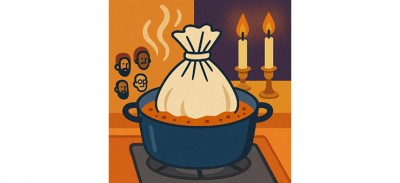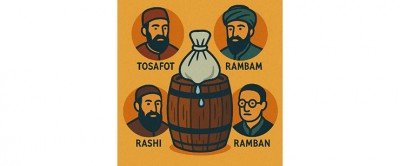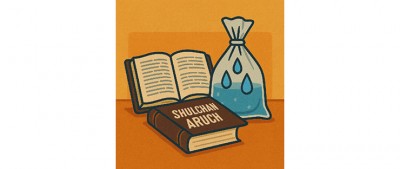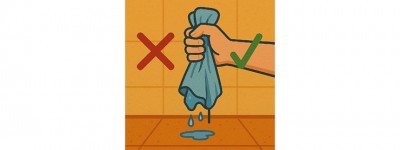




I.Recap
Last issue we discussed the halachic concerns surrounding traditional Bukharian Jewish dishes, Bakhshi Khaltagi and Khalta Savo, cooked in bags and prepared for Shabbat.
The issue arises when removing the cooked rice and meat from the bag, as vigorous shaking or squeezing might occur, potentially violating Shabbat prohibitions. The discussion centers around two melachot: melaben (laundering) and dash/mefarek (squeezing/separating liquids from solids). We analyzed the permissibility of wringing out garments on Shabbat, considering different opinions from Rambam, Tosafot, Tur, and Rashba, and their implications for handling the bag-cooked dishes on Shabbat.
II.Opinions of the Rishonim
The Gemara discusses a case of a barrel plugged with a cloth stopper to seal a hole from which wine is drawn. The Rishonim have differing opinions on whether the cloth stopper constitutes a violation of squeezing on Shabbat.1
(A) Melaben Applies to All Liquids
The R”I, Ramban, Rambam, and Rashi maintain that the prohibition of melaben applies universally, regardless of the type of liquid being squeezed from wet fabric or clothing. According to this view, it makes no difference whether the liquid is water, wine, or oil—any act of squeezing out liquid from a soaked material constitutes a Torah prohibition (or rabbinic according to others) of melaben.
(B) Melaben Applies Only to Water; Other Liquids Fall Under Mefarek
Rabbenu Tam, the Rashba, and the Rivash argue that melaben is specifically tied to water. When dealing with other liquids, such as wine or oil, the issue falls under the prohibition of mefarek (separating liquids from solids). They differentiate based on intent:
If the liquid is being discarded, squeezing it out is permissible.
If the liquid is being collected for use, then it is prohibited.
(C) The Aruch’s Distinction Based on Nicha Lei
The Aruch agrees with Rabbenu Tam’s conclusion that melaben does not apply to liquids other than water, but for a different reason. He argues that since the liquid being squeezed from the barrel is not nicha lei (the result is not desirable), it is not considered squeezing. In his view, there is no distinction between whether the liquid is being wasted or used—the determining factor is solely whether the liquid is wanted or not.
(D) The R”I’s Counterargument: Melacha She’eina Tzricha Legufa
The R”I disputes the permissive opinions, contending that squeezing out any liquid—even if it is being discarded—remains forbidden. He classifies this act as a melacha she’eina tzricha legufa (a labor not needed for its own purpose), which is still prohibited on a rabbinic level, if not biblically.
III. The Opinion of Shulchan Aruch
a. Melaben
When it comes to the melacha of melaben, the Mishnah Berurah (320:55), citing the Taz, interprets the opinion of the Shulchan Aruch (Siman 320:18) being in accordance with Rabenu Tam that the prohibition of "melaben" (laundering) only applies to clear liquids, as they have a cleansing effect.2 Even if the water is being discarded, it's still considered a violation because the desired effect of cleaning is achieved.3
b. Mefarek
When it comes to squeezing other liquids from a cloth, the Taz (320:12) interprets Maran's ruling in line with the Aruch, and only coupled with another lenient factor—namely, that the liquid is being discarded—which serves as an additional halachic basis to permit it. This view is also supported by the Kaf Hachayim (320:104-105).
The Magen Avraham (320:23), however, understands that Maran follows the opinions of Rabbenu Tam, the Rashba, and the Rivash, while also taking into account the view of the Rambam. Therefore, he requires that the cloth stopper used for a barrel of wine have a handle, in deference to the Ra’avad’s concern—since the handle helps prevent squeezing.
IV. Handling A Wet Cloth
The Rama,4 citing the Mordechi, rules that moving soaking wet clothes on Shabbat is forbidden if one is particular about the excess water, as it may lead to wringing or squeezing. The Mishnah Berurah5 clarifies that the Sages were concerned about situations where one doesn’t want the water to remain in the fabric. However, for cloths or fabrics that are constantly soaked in water, do not raise this concern. As such, Bakhsh and Khalta Savo bags may be handled on Shabbat.
V. Bakhsh and Khalta Savo Bag
The water inside the pot where the Bakhsh and Khalta Savo was cooked is considered a liquid (mashkeh) and not plain water, since it has absorbed the taste of meat and rice during the cooking process. Such water is not plain water because it greasy and dirties rather than cleans.
Therefore, according to the Shulchan Aruch, who rules in accordance with the Aruch and taking into account another halachic factor, it would be permitted to shake the rice out of the Bakhsh and Khalta Savo bag, as liquid is usually discarded. Rav Yisrael Chayim Motayev6 rules that when shaking the rice out of the Bakhsh and Khalta Savo bag on Shabbat, there is no intention to squeeze out the liquid from the bag. Since the act of squeezing is not the person’s goal, this situation is classified as a davar she’eino mitkaven—an unintended consequence. Furthermore, squeezing is not a guaranteed outcome, and even if there is uncertainty about whether it will occur, in cases of doubt (safek) as to whether a prohibited result (such as squeezing) will inevitably happen (pesik reisha), the halachah follows the lenient opinion that it is permitted. Therefore, shaking the rice out of the bag is allowed, provided the person’s intention is simply to serve the food and not to remove the liquid.
Preparing baksh in the oven or on a pot eliminates potential issues related to squeezing liquids from the bag on Shabbat. Using a plastic cooking bag is a practical solution, as it allows for easy disposal or cleaning without the hassle of washing a greasy bag after Shabbat. However, plastic cooking bags can pose health risks due to potential chemical leaching (BPA and phthalates, and microplastics), especially when heated.
1 See Ayin Yedid, Shabbat vol.1, pg 655
2 This is also the conclusion of the Biur Halacha (D’H "Yesh mi shematir") and the Levush, who write that the Shulchan Aruch rules like Tosafot and those who follow their view.
3 Melaben being specific to squeezing water is supported by other rulings of the Shulchan Aruch, such as O.C 334:24, which discusses placing drinks on a garment to extinguish flames, with some permitting all drinks except water due to its washing effect. Additionally, O.C 319:10 allows filtering clear wine and water through a strainer.
4 O.C 302:46
ואסור לטלטלם שמא יבא לידי סחיטה והוא שמקפיד על מימיו (מרדכי פ' חבית)
5 O.C 302:172
היינו שאין רוצה שיהיה בהם מים אבל המטלניות ששרוים תמיד במים אין לחוש ומותר בטלטול
6 Mishmeret Haminhagim, Siman 3
Serving From Bakhsh/Khalta Savo Bag (Part II)
Typography
- Smaller Small Medium Big Bigger
- Default Helvetica Segoe Georgia Times
- Reading Mode




